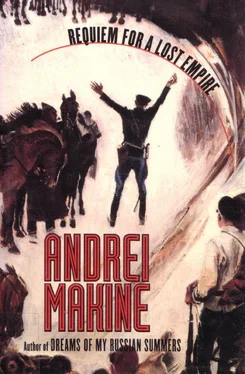That night at the hospital I took out of my overnight bag the folder with the sheaf of paper Vinner had handed to me. Then the English newspaper; the photo of Shakh, the caption: "One of the barons of the nuclear network." That photo, that stupid caption. There would be no other record of his life.
Opening the folder, I came upon a snapshot Vinner must have slipped in as bait. I studied it, recognized it. Long ago, after more than three years of our life abroad, I was spending two weeks with you in Russia. It was in February, the abundance of light already heralded the spring. Intoxicated by these days of sunshine, for a moment we believed we could live a life like other people, quietly accumulating memories, letters, photos. I had bought a camera and, to try it out, I had taken a first test shot, aiming the lens low. That had produced this strange photo: the ground covered in snow, a section of an old wooden fence, two shadows on the white surface, dazzling in the sunlight. We did not keep the photos taken during those two weeks. In the event of a search they could have betrayed us. Only this shot, with no identifying marks and no date, had come with us on our travels (you sometimes used it as a bookmark), indecipherable to other people.
"No other record of her life." I silenced this thought before having really formulated it. Too late, for the truth was there, unstoppable. Soon everything would be reduced to that winter snapshot, from which I alone could still call to mind your features, picture one of the days of your life.
My own disappearance, which for Vinner was only a question of organization, suddenly appeared in quite a different light from these cloak-and-dagger games. Dumbfounded, I saw myself as the last person who could speak about you, tell your real name, give you an existence among the living, if only through the ludicrous means of recollecting the past.
Feverishly I set about seeking for some glimpses of our old life, glimpses of cities, of skies, moments of joy. They surfaced and quickly disintegrated under the touch of memory. I needed a more solid fact, a particle of you whose evidence would be beyond dispute. A certificate of civic status almost, I thought, with stupidly administrative but irrefutable information on it, like place and date of birth.
Place and date of birth… I repeated these details that must surely hold your life back from the brink of oblivion, and recalled the day when I had learned them. A rainy day in Germany, on a journey that had exasperated me because of its lack of objective, when suddenly this objective arose. The story you told me.
It was several months before the end of the nomadic life that had been ours for so many years. You mentioned a town to me in what, until recently, had been East Germany and we set off, soon crossing the abolished frontier. The contrast was still visible: "A tourniquet has come off," I said to myself, "and the benefits of the West will now flow into the limb constricted for so long. The benefits or maybe the poison. Both, probably." We could already observe the start of this transfusion process. Roads were beginning to be mended, housefronts were being cleaned. But the rain that day was eliding the changes under the gray light of autumn, mingling the two Germanies with the same question: "How can they live in these dark, damp little towns that go to sleep at six o'clock in the evening?" In one street a window facing out onto a dirty, noisy crossroads gave me a glimpse of a very white lace curtain, a flowering plant, a crowd of little china vases and figurines-all of it only three yards away from the huge trucks thundering up a viaduct. And further on, in the low doorway to a tavern, men were gathered in folk costumes and their laughter mingled with the sounds of merry, strident music.
This trip toward the east was becoming more and more painful to me. Before we set off you had vaguely explained to me that we had a contact to pick up in one of these towns I was in a hurry to drive through. Their ugliness and the poverty of the bare forests made the purpose of our trip uncertain in advance, held in suspension in the glaucous air of this rainy day. Absurd, like all our work now, I thought, recalling my first visit to Berlin, then still divided by the Wall. Your silence, the silence of someone who knows where she is going, weighed on me. It was when I saw the lace curtains and heard the din of the folk music that I began to speak, with assumed irony.
"I know I've become suspect in your eyes and Shakh's. Heavens above! I've dared to question the value of our heroic mission. But, even as I crumble under your mistrust, I think I have a right to know what we're doing in this moldy little hole."
My tone was simply a fresh attempt to provoke a real explanation, to make you voice the doubts I sensed in you. You looked at me as if you did not understand and all you answered was, "I don't know." Then, since I looked nonplussed, rousing yourself from your reverie, you added, "We're looking for the exact place where I was born. It can't be far away. It could be on the road out of this village. They've done a lot of building since then. I thought you might be interested. And as we had three hours to spare… It must be here. Under those warehouses. A pretty place to be born. Shall we walk a bit?"
The outskirts of a town, corrugated tin warehouses, a terrain of withered grass where I parked the car. We took a few steps in driving rain and, as we studied the gray fields beyond the sheds, you told me about those long hours of sunlight, one fine day in March 1945.
It had happened on that same road, narrower in those days and broken up by tank tracks. The warm steam rising from the fields in the dazzling sun mingled with the brief gusts coming from the patches of snow piled up in the shadow of the bushes. The place was empty: the Germans had withdrawn during the night, the main body of Russian troops was held up by fighting farther north and would only appear on this road toward evening. For the moment all one could see was these two clouds of dust, two groups of civilians advancing painfully toward one another. One, stretched out into a faltering line of some twenty people, was traveling toward the west. The other, more compact and less stricken with weariness, was walking toward the east. The first, survivors of a camp liquidated at the approach of the Russians, had been taken before dawn to a railroad station, from which they were to be sent farther west into the depths of the country. Halfway there, their guards had learned that the station was already under enemy attack. They had abandoned their prisoners and made themselves scarce. The prisoners had not altered the direction of their walk, they had simply slowed their pace. The others, those who were going toward the east, young women and a few adolescent boys, were members of the labor force rounded up by the Germans from the occupied Soviet territories and sent to Germany. Guessing the outcome of the war, the peasants, for whom these young people had been working, had got rid of their serfs, and were themselves fleeing west before the Russian offensive. One of the women was pregnant. Her master had stooped to inseminate an inferior race. She 'walked along, wailing continuously, her fingers joined beneath her enormous belly.
The two groups drew closer to one another, halted near the crossroads, stared at one another in silence. Only a few minutes earlier the young women walking east had been convinced they had touched the extreme limits of misery: several days on the road without food, bitter cold at night, a burst of gunfire that morning from a German truck. Now no moaning could be heard in their group any longer. The pregnant woman, too, had fallen silent, leaning against the slatted side of an abandoned trailer. They stared in silence and simply had no conception of what they were seeing. The beings in front of them could not be recognized according to conventional attributes: Russians or Germans, men or women, living or dead. They were beyond such differences. You could meet their eyes only for as long as it took to perceive in them, as it were, the first steps of a staircase descending into darkness, although these eyes contained it in its entirety, down to the very depths. One who was lagging behind the line of prisoners had just fallen. He was carrying a strange wooden box solidly fixed to his forearm.
Читать дальше










